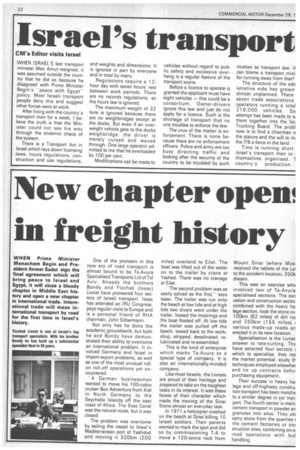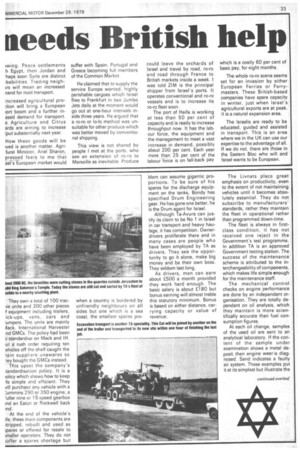Israel's transport [weds British help
Page 24

Page 25

If you've noticed an error in this article please click here to report it so we can fix it.
WHEN ISRAEL'S last transport minister Meir Amut resigned, it was assumed outside the country that he did so because he disagreed with Prime Minister Begin's "peace with Egypt" policy. Most Israeli transport people deny this and suggest other forces were at work.
After living with the country's transport men for a week, I believe the truth is that the Minister could not see his way through the endemic chaos of the system.
There is a Transport Act in Israel which lays down licensing laws, hours regulations, construction and use regulations, and weights and dimensions. It is ignored in part by everyone and in total by many.
Regulations require a 1 2hour day with seven hours' rest between work periods. There are no records regulations, so the hours law is ignored.
The maximum weight of 32 tons is ignored because there are no weighbridges except at the docks. But even if an overweight vehicle gets to the docks weighbridge, the driver is merely cursed and waved through. One large operator admitted to me that he overloaded by 100 per cent.
Modifications can be made to vehicles without regard to public safety and excessive overhang is a regular feature of the transport scene.
Before a licence to operate is granted the applicant must have eight vehicles — this could be a consortium. Owner-drivers ignore this law and just do not apply for a licence. Such is the shortage of transport that no one troubles to enforce the law.
The crux of the matter is enforcement. There is none because there are no enforcement officers. Police and army are too busy directing traffic and looking after the security of the country to be troubled by such niceties as transport law. V can blame a transport mini for running away from that?
The structure of the adr istrative side has grown almost unplanned. There seven trade associations operators running a total 219,000 vehicles. So attempt has been made to v, them together into the !sr. Trucking Board. The probl now is to find a chairman v the stature and the will to m, thelTB a force in the land.
Time is running short Israel's transport men to themselves organised. 1 country's production
ming. Peace settlements h Egypt, then Jordan and -haps soon Syria are distinct ibabilities. Trading neighirs will mean an increased nand for road transport.
Increased agricultural pro;tion will bring a European )ort boom and a further inased demand for transport.
e Agriculture and Citrus ards are aiming to increase tput substantially next year.
How these goods will be ived is another matter. Agrifural Minister, Ariel Sharon, pressed fears to me that ael's European market would suffer with Spain, Portugal and Greece becoming full members of the Common Market.
He claimed that to supply the service Europe wanted, highly perishable cargoes which Israel flies to Frankfurt in two Jumbo Jets daily at the moment would go out at one-hour intervals inside three years. He argued that a ro-ro or lo-lo method was unsuitable for other produce which was better moved by conventional shipping.
This view is not shared by people I met at the ports, who see an extension of ro-ro to Marseille as inevitable. Produce
could leave the orchards of .Israel and travel by road, ro-ro and road through France to British markets inside a week. I was told ZIM is the principal shipper from Israel's ports. It operates conventional and ro-ro vessels and is to increase its ro-ro fleet soon.
The port of Haifa is working at less than 50 per cent of capacity and is ready to increase throughput now. It has the labour force, the equipment and the management to meet a vast increase in demand, possibly about 200 per cent. Each year more than 25 per cent of the labour force is on fall-back pay which is a costly 60 per cent of basic pay, for eight months.
The whole ro-ro scene seems set for an invasion by either European Ferries or Ferrymasters. These British-based companies have spare capacity in winter, just when Israel's agricultural exports are at peak. It is a natural expansion area.
The Israelis are ready to be educated, guided and assisted in transport. This is an area where we in the UK can use our expertise to the advantage of all. If we do not, there afe those in the Eastern Bloc who will and Israel wants to be European.




































































